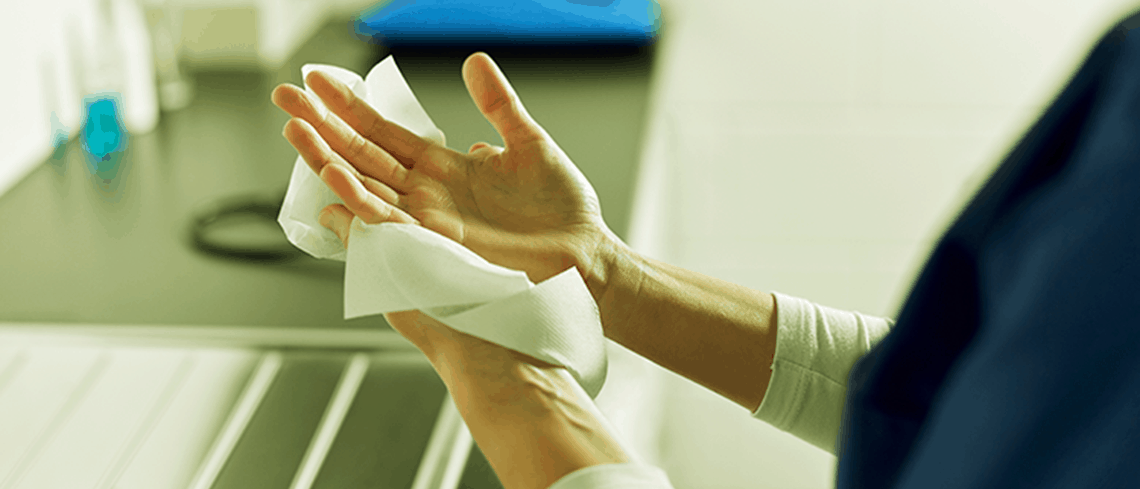Using Antibacterial wipes in hospitals and clinics
With the advancement in medical technology came the realization that germs can be present anywhere and can stay hidden even in front of our eyes.
As a collective effort, the human race has been trying to discover ways of eliminating the threat of germs for a long time. Among other ways, antibacterial wipes have become a modern and most suitable alternative to traditional cleaning and disinfecting methods, especially in hospitals.
In the pre-antibiotic era, cross infection usually proved to be a nail in the coffin for someone suffering from an ailment. This is one of the main reasons why infection prevention and control in hospitals and clinics is highly stressed and timely implemented.
Although at home, antibacterial wipes can be used to disinfect surfaces and objects occasionally, at hospitals and clinics, their use is governed by several crucial steps.
Regardless of the cleanliness and disinfection protocol, measure, or method, the motive for using antibacterial wipes remains the same - curb the spread of contagious diseases such as MRSA, Covid-19, cold, flu, etc.
Cross-infection is a real thing
Many patients with different ailments visit hospitals and clinics daily, and the threat of cross-infection via the skin, surfaces, objects, and even medical equipment is real.
To stop any such catastrophe, hospital staff use medical grade disinfectant wipes and multi-use antibacterial wipes with a set motive. These wipes contain a biocidal solution that has proven efficacy in avoiding infectious diseases.
Chemically formulated to fight most germs and inhibit the growth of bacteria, they have a lot of practical uses beyond medical facilities.
For example, from removing dirt and controlling mold and mildew buildup to disinfecting common home hygiene hotspots to prevent infections, medical grade disinfectant wipes are one of the best ways to protect yourself from the worst germs on the planet.
Sterilization is important
Washing your hands with antibacterial soap and water is the best method to ensure infection prevention and control in medical facilities. However, this hand hygiene measure can become difficult to uphold in various hospital settings and circumstances.
Healthcare providers have started using antibacterial wipes in hospitals and clinics to ensure that their hands remain germs-free even without soap and water.
In addition, spraying disinfectants combined with medical-grade sterilization provides a contamination-free treatment area.
The medical industry uses a variety of disinfectant wipe brands, each with different chemical disinfectant formulas shown to eliminate germs and bacteria.
Different locations
Multiple locations in the medical facilities, such as the nurse's stations, computer stations, sign-in areas, waiting room, patient beds, bathroom hygiene hotspots, etc., require regular cleaning and disinfection throughout the day to reduce the risk of cross-contamination or the spread of infections.
Using medical disinfectant wipes to limit pathogens in high-traffic areas will keep the healthcare environment clean and help reduce health risks between professional cleaning services.
Medical equipment cleaning
Many healthcare professionals use antibacterial multiuse wipes to clean and disinfect various medical equipment.
And if you have medical equipment at home, such as a CPAP machine or an air purifier, it’s a good idea to wipe down the buttons and knobs you frequently touch.
In addition, medical grade disinfectant wipes are made from a technical fabric that quickly removes dirt, smudges, and spots without damaging the surface.
When antibacterial wipes aren’t enough
While antibacterial wipes heavily contribute to infection prevention and control in hospitals and clinics, you shouldn’t rely on them to disinfect the entire facility.
In critical areas with a high risk of infection transmission, quaternary or sporicidal disinfectants such as disinfectant sprays and antiseptic liquids are more effective than medical disinfectant wipes.
Areas requiring high-level sporicidal disinfectants include but are not limited to:
- Isolation rooms: Patients admitted to isolation rooms usually suffer from a highly contagious disease that forces the hospital staff to isolate them from the rest of the facility. Upon getting discharged, these rooms require high-level disinfection to eradicate harmful pathogens and keep them from spreading to staff and patients.
- Surgical procedures & operations: Patients requiring any surgical procedure or operation are susceptible to infections. All the equipment and surfaces within the room must be sterilized between every operation.
- Bodily fluids contact with equipment: Blood, waste, vomit, or other bodily fluids carry bacteria that causes infection if not properly cleaned and disinfected. You'll need to thoroughly disinfect any surfaces or equipment used recently because these might have come into contact with harmful pathogens that can’t be seen with the naked eye.
FAQs
Are antibacterial wipes safe for the skin?
Antibacterial wipes kill germs and bacteria and are safe for the skin. Most hand wipes are infused with moisturizing and skin care ingredients to help soothe hands and prevent dry and cracked skin.
What are antibacterial wipes used for?
Antibacterial wipes are pre-moistened towelettes that contain a sanitizing or disinfecting formula that kills or reduces germs on surfaces and skin.
Can you use antibacterial wipes on a wound?
You can use antibacterial wipes on a wound as they effectively kill germs and bacteria. They can be used to clean wounds and the surrounding skin or to quickly clean the hands before tending to injuries on yourself or others.
